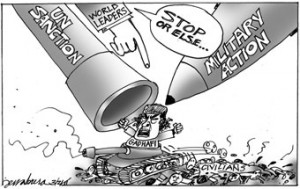Intervention
It wasn’t, and couldn’t have been, an easy, black-or-white decision. But Resolution 1973 of the UN Security Council, reached three days ago and authorizing “all necessary measures” required to impose a no-fly zone in Libya, a sprawling country in the throes of an emerging civil war between the forces of dictator Moammar Gadhafi and rebels emboldened by the peaceful revolutions in Tunisia and Egypt, was the right if difficult step to take.
On Sunday, the world saw exactly what those necessary measures consisted of: cruise missiles and fighter jets, used to attack Libya’s air defense systems, including the radar and communication facilities the systems depended on. It was only the first phase in the plan to prevent Gadhafi from committing new atrocities against his own people, and it wasn’t pretty. Over a hundred people, many of them civilians, were reported killed in the strikes, and the near-certainty that these casualties were either volunteers or conscripts deployed as human shields only made the first attacks, launched by the United States, France and the United Kingdom, even more difficult to contemplate.
But an international community aghast at the sudden transformation of peaceful protests in Libya into armed confrontations, and then horrified as the uprising against Gadhafi turned into a bloodbath of anti-Gadhafi rebels, could not stand idly by as the death toll mounted. The price of intervention, however, in the form of a no-fly zone that would prevent Gadhafi’s air force from pummeling rebel forces and the civilian population that supported them, was high: Before the zone could be imposed, air defense systems needed to be destroyed—and the act of destruction was almost certain to cause what military planners call collateral damage: civilian deaths.
As it is, Resolution 1973 only imposes a no-fly zone; there is no consensus in the Security Council that military intervention must result in Gadhafi’s removal. In other words, the attacks on Sunday were meant only to disable Gadhafi’s capability to launch air strikes against the rebels. Diplomats may fudge the issue and say the ultimate objective of the international community’s intervention is parity. But the reality is, impressive as Sunday’s flexing of Western military muscle was, the United Nations has no clear “exit strategy” in Libya.
That is partly why the decision was a difficult one. The Security Council only managed to approve Resolution 1973 because Gadhafi’s increasingly brutal attacks on his own people could no longer be countenanced, and because Russia and China did not use their veto and merely abstained from the vote. To be sure, an assertive France had forced the issue, and according to the latest reports the seesawing in US government opinion was only decisively stopped when US Secretary of State Hillary Clinton came out forcefully for military intervention. But it was crucial that any such intervention came with the Security Council’s blessings, and late last week—rapid by UN standards; an eternity of indecisiveness, for Libyan rebels—the world’s major powers finally resolved to act (or in the case of Russia and China, not to stand in the way of action).
Perhaps even more crucial, UN action was supported by member-states of the Arab League.
The argument can be made that the UN followed a double standard in Libya; other uprisings, countered by brutal government crackdowns, continue in Bahrain and Yemen. This is yet another reason why the Security Council decision must have been an arduous one to negotiate.
But Libya does not only produce enough oil to pose a real threat of disruption to the world economy; it has a track record of financing terrorism. In recent years a mellowed Gadhafi engaged the international community in a kind of petrodollar-induced rapprochement; the rebellion, which nearly overthrew Gadhafi in the early days, and which sharpened his sense of isolation, has the potential to force Gadhafi back to his old ways. For that reason, too, it was incumbent on the UN Security Council to take action to prevent, down the tortuous road, another Lockerbie.















